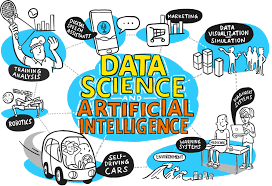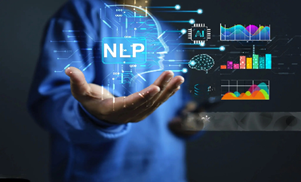

Data Science and Artificial Intelligence are rapidly growing field of computer science in the last couple of decades. Data Science, and Artificial Intelligence especially Machine Learning and Deep Learning are revolutionizing many domains including the medical field, self-driving cars, recommendation systems, robotics, etc. A branch of computer science that can create systems that are capable of doing such tasks that would normally require human intelligence is called Artificial Intelligence. Machine learning and Deep learning are further applications of AI that give machines the ability to learn without being explicitly programmed. Data Science combines subject matter expertise with specialized programming, advanced analytics, artificial intelligence (AI), machine learning, and math and statistics to uncover valuable insights hidden in an organization's data.

The concept of artificial intelligence (AI) originated in the middle of the 20th century when scientists started looking into the idea of building robots that might replicate human intellect. Early advancements in AI included symbolic AI, which concentrated on expert and rule-based systems. However, computational limitations restricted the development. The 21st century saw a renaissance of interest in artificial intelligence (AI) due to developments in processing power, algorithms, and data availability. With the rise of machine learning, especially deep learning, artificial intelligence (AI) systems can now learn from enormous volumes of data and do difficult tasks like natural language processing and recognizing images. The goal of data science, on the other hand, is to use statistical and computational methods to extract information and insights from raw data. Data science gained traction across sectors as big data technology and the explosion of digital data drove innovation, competitive advantage, and decision-making. These days, artificial intelligence and data science are developing at a breakneck pace, reshaping technology and impacting almost every facet of our lives and society.
AI finds its applications in a vast range of technologies. Some of the interesting applications of AI that are revolutionizing the world are as follows:
AI models are capable of analyzing medical data to help with drug discovery, medical imaging analysis, individualized therapy suggestions, and illness diagnosis. Several software can be built that enable doctors to diagnose the disease earlier to ensure timely procurement.

AI algorithms have been widely used for understanding textual data to assist humans in the domain of Natural Language Processing. AI models also help in generating human languages. It enables humans to build certain applications including chatbots, language translators, text summarizers, and sentiment analysis systems.

Visual data from various domains can also be interpretable due to the AI-powered systems. They enable machines to interpret visual data and can be used for several tasks like pattern recognition, object detection, facial recognition, autonomous vehicles, number plate detection, and x-ray images.
AI finds its applications in the field of self-driving cars. AI algorithms enable us to process sensory data and make decisions in real time which is the core of self-driving cars. These algorithms take data from sensors, process them, and give the response in milliseconds.

The powerful algorithms of AI can analyze user behaviors and preferences to give personalized recommendations in several applications that include streaming services, e-commerce, and social media platforms.
AI algorithms enable us to build robots that perform different human tasks autonomously or semi-autonomously in various daily life situations like manufacturing, healthcare, logistics, and agriculture.

There is a vast range of applications in the field of Data Science. Although this is impossible to list them all in this article yet some of the very well-known sectors in which Data Science is facilitating are as follows:
Statistical analysis and predictive modeling are some of the techniques that Data Scientists utilize to extract patterns and trends within the data to inform decision-makers to take serious steps to avoid any future complications.
Data Science finds its application in detecting fraudulent activities by developing special algorithms. These algorithms are used to detect any kind of abnormality or fraudulent transaction in different sectors including e-commerce, finance, and insurance by analyzing trends and anomalies in the data.
A Data Scientist is required to analyze and uncover the trends and patterns related to time series data over time. It is very useful in many fields including stock market predictions, weather forecasting, finance, and sales forecasting, to timely tell the future trends to the stakeholders and higher authorities so that they can make decisions on time.

Customers can be divided into groups according to their preferences, behavior, or demographics using data science techniques by learning trends and patterns from past data, which allows for more individualized marketing efforts and experiences.
There are a lot of reasons that ensure a lot of Future Jobs in the field of Data Science and AI. As technology grows, things are connected to the internet and data is gathered through many devices. So in the future as well as in current situations, there is a need for a Data Scientist who can handle this huge data, find trends and patterns inside the data, and inform the higher authorities and the stakeholders to grow their businesses.
The need for candidates with experience in data science is rising at an unprecedented rate, which emphasizes how crucial it is to draw useful conclusions from massive volumes of data. Across a variety of sectors, there is a considerable need for positions like data scientists, data engineers, business analysts, and data architects. To make better decisions and obtain a competitive edge, businesses are looking for experts in statistical analysis, machine learning, and data visualization. The need for qualified data scientists is continually growing as more and more businesses rely on data-driven strategies for innovation and expansion. This indicates a wealth of job prospects in the upcoming labor market.
The need for jobs connected to artificial intelligence (AI) is rising dramatically in the future labor market, which is indicative of the technology's explosive expansion. Across all industries, positions like AI engineers, data scientists, machine learning specialists, and AI ethicists are becoming more and more important. Businesses are aggressively looking for experts who can create AI algorithms, evaluate large amounts of data, and guarantee the ethical application of AI. AI is revolutionizing industries such as healthcare, banking, and manufacturing, and as a result, there is a growing demand for professionals who can fully utilize AI. This suggests that jobs in AI have a bright future.
First, let's examine the pay scales for data scientists across several nations. It's important to keep in mind that pay statistics can be challenging to adequately portray because they can vary greatly based on position, company, and individual. Salaries can differ significantly even within a nation, and statistics aren't always reliable. But I've relied on three sources: DataCamp, Indeed, and Glassdoor. When you apply for data scientist employment, it's my advice to consider a variety of opportunities in your field. All salaries are given in the currency of the specific region.
| Country | Data Scientist Salary (USD) | AI/ML Engineer Salary (USD) |
|---|---|---|
| United States | $102,988 | $160,140 |
| United Kingdom | $64,087 | $80,750 |
| Canada | $103,623 | $101,657 |
| Australia | $86,051 | $93,724 |
| Germany | $74,974 | $76,283 |
| Pakistan | $7,717 | $7,071 |
| India | $17,244 | $11,451 |
| Singapore | $72,000 | $117,966 |
Making the switch to data science & AI offers experts in disciplines like statistics and mathematics an interesting career path full of opportunities. The rigorous analytical abilities developed in these fields provide a strong basis for exploring the field of data interpretation and analysis. Understanding statistical principles gives people the capacity to identify patterns and trends in datasets, which is necessary for data science professionals to derive meaningful insights. Additionally, mathematicians have a thorough grasp of optimization methods and algorithms, which are essential building blocks of AI and machine learning algorithms.
Furthermore, people with a variety of academic backgrounds may make valuable contributions since data science is an interdisciplinary field. For example, statisticians provide knowledge in hypothesis testing and experimental design, which is essential for carrying out thorough studies and deriving trustworthy conclusions from data. Calculus and linear algebra experts are invaluable in the development and optimization of intricate AI and machine-learning models. Professionals with backgrounds in mathematics and statistics are well-positioned to take advantage of this developing industry and start fulfilling careers in data science and AI, where their analytical skills are highly valued.
To put it briefly, the combination of data science, AI, statistics, and mathematics is a powerful tool for solving complicated problems in a variety of fields. Due to their strong mathematical backgrounds, people in these subjects are well-positioned to succeed in positions like AI engineer, machine learning engineer, data scientist, or data analyst, where they can use data-driven insights to drive decision- making processes and promote innovation. Mathematicians and statisticians are in a unique position to navigate the ever-changing field of data science & AI and shape the future of analytics-driven enterprises, as demand for qualified data professionals increases.
The article provides an overview of the rapid growth and applications of Data Science and Artificial Intelligence (AI), highlighting their transformative impact across various domains such as healthcare, natural language processing, computer vision, and autonomous vehicles. It also discusses the increasing demand for professionals in these fields due to the evolving technological landscape, emphasizing the promising job prospects in Data Science and AI.